ISKCON Rolls Out Strategies Against Domestic Abuse
By Madhava Smullen | Мар 06, 2021
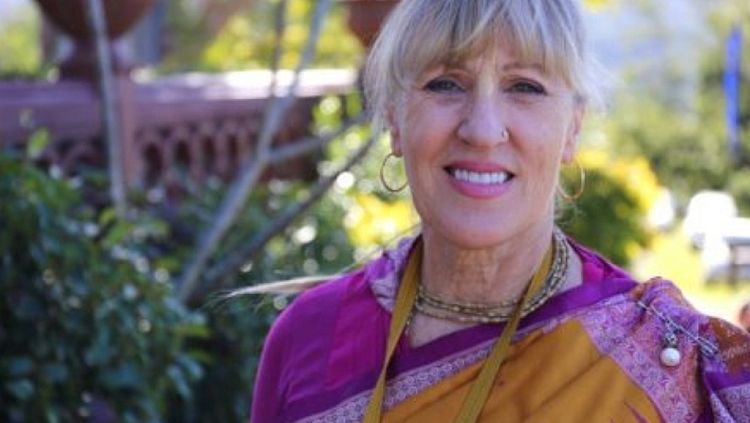
For over twenty years Vaishnavi Ministers, currently led by Global Minister Radha Dasi, have been working to support devotee women’s voices and rights, including efforts to address domestic abuse (also known as domestic violence) within ISKCON.
A major milestone in preventing such abuse came in February 2020, when ISKCON’s Governing Body Commission adopted a global policy against domestic abuse. Since then, regional Vaishnavi Ministers and local devotees have worked together on practical steps to ensure that protection for women, children, and families is the reality for devotees worldwide.
The policy came after the North American GBC released an official statement condemning domestic abuse in January 2019, resolving: “Domestic abuse is illegal, indefensible and never acceptable within the International Society for Krishna Consciousness (ISKCON). Any interpretation of Vaishnava religious or social teachings that condones, endorses, or justifies domestic abuse is rejected by the North American Governing Body Commission (GBC).”
The statement also explained, using statistics from sources like the National Coalition Against Domestic Violence, that domestic abuse “is a serious global problem within society-at-large, and is the leading cause of injury to women in many countries…. Contrary to popular belief, domestic abuse is not limited to a particular ethnic, racial, or religious group, nor is it limited to people of a particular economic status. It is a problem that plagues all sectors of society.”
The statement pointed out: “Most domestic abuse (about 85%) is perpetrated by men against women, in the role of a husband or intimate partner. In the United States, 1 in 4 women will be victims of domestic abuse in their lives.”
Sadly, ISKCON is not immune to the problem of domestic abuse. “I have heard many stories of women in ISKCON who have suffered abuse at the hands of their intimate partner,” says Australian Vaishnavi Minister Krishnarupa Dasi. “Since I was appointed as the women’s minister by the ISKCON Australia National Council in 2016, protection of women has been at the top of my mind.”
“Domestic abuse also affects the ISKCON community as a whole,” says Radha Dasi. “Not only are children exposed to domestic abuse more likely to suffer from mental health challenges as adults, domestic abusers sometime target friends and family of their partners. Everyone in a community benefits when we can prevent abuse.”
Australia and International Efforts
Back in 2017, Krishnarupa Dasi developed a groundbreaking seminar on the prevention of sexual harassment in ISKCON. She traveled to temples in Australia delivering the seminar to devotees in general as well as to managers, for whom attendance was mandatory. When asked what other workshops they would find valuable, attendees wrote down “domestic abuse.”
After the North American GBC released its statement against domestic abuse, Krishnarupa proposed that the National Council in Australia adopt this policy, which it did. Backed by the very supportive National Council, she developed a two-hour seminar on domestic abuse, entitled “Harmony in the Home,” which was also mandatory for managers to attend.
Then COVID struck. Krishnarupa, however, didn’t let this slow her down. With help from regional Vaishnavi Ministries, she began offering her seminar virtually via Zoom to devotees in South Africa, Latin America, Mexico, and ISKCON communities in Australia.
“We’re pushing that both women и men attend,” she says. “Because we really need to communicate this to everyone.”
The Harmony in the Home seminar includes instructions from Srila Prabhupada and the scriptures on how the husband and wife should treat each other; explanations of the difference between normal conflict in marriage and domestic abuse; legal definitions of domestic abuse; and the different types of abuse, such as physical, psychological, emotional, cultural, religious and financial.
The seminar covers the well-known Duluth Power and Control Wheel, and gives active bystander training, such as how to identify a victim of domestic abuse, what to do and what not to do; and legal issues such as violence apprehension orders, which vary from country to country.
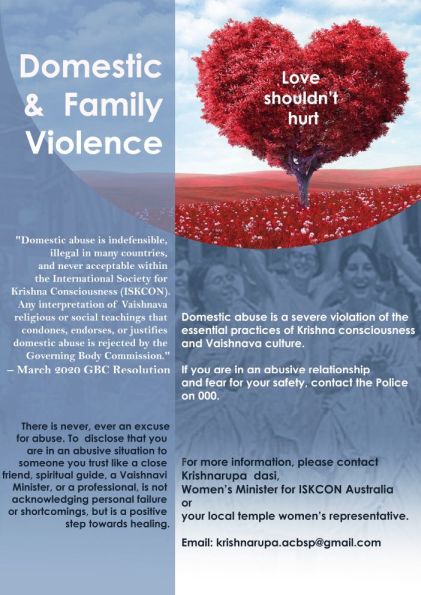
The Love Shouldn’t Hurt poster, displayed in ISKCON temples in Australia, as well as some in North America and Brazil
Krishnarupa says: “I also touch on what to do if a managing authority or even a guru instructs you, as a victim of domestic abuse, to ‘Just tolerate it, it’s your karma; go away for a while if it gets particularly violent, and then come back.’ I’m very forthright in telling them that this is not the thing to do. If someone gives you this advice it’s clear that they do not know about the cycle of abuse.”
She adds that domestic abuse can also be perpetrated by the female in the relationship. Statistically, however, she asserts, most domestic abuse is perpetrated by men.
Krishnarupa also has a high quality full-color brochure entitled “Love Shouldn’t Hurt,” along with a poster, displayed in a prominent position near all ISKCON temple rooms in Australia. The poster and brochure are also being translated, and the resources page customized, for each part of the world. So far, they are also displayed in some temples in North America and Brazil, while South African ISKCON leaders have shared them via their online networks.
The brochure speaks directly to victims in bullet-pointed lists, telling them, “You are not alone,” “You are not to blame,” “You deserve a safe and happy life,” and “There are people who can help.” It also cites reasons why sufferers of abuse don’t leave, such as: “threats of violence,” “lack of self-confidence and self-esteem,” “an unsupportive community,” “being convinced that the abuser will stop or change,” or “fear of stigma or humiliation if it becomes public.”
Advice on how to help a friend or community member who is being abused is given, including, “Do NOT blame the victim for the abuse;” “Be a caring, objective listener in confidence;” “Encourage your friend to seek professional help;” and “Do not confront the abuser.” The brochure also discusses what domestic abuse is, the cycle of abuse, and what to do if you are being abused. There are contact details for local counseling, crisis and police services, and directions for how to report abuse to an ISKCON authority who will listen objectively and not blame you, such as your local ISKCON Vaishnavi Minister.
South Africa
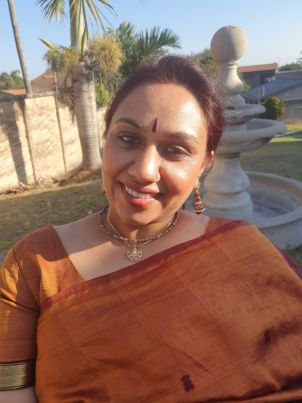
South African Vaishnavi Minister Krsangi Radhe Dasi
Vaishnavi Ministers in other countries are also adding more proactive efforts to prevent domestic abuse.
In South Africa, the National Council has endorsed the allocation of Vaishnavi Ministry representatives to ISKCON centers around the country. Headed by Minister Krsangi Radhe Dasi, they facilitate discussion; provide confidential support for women who have experienced abuse in the past, as well as those who are still in abusive relationships; and have assigned a team comprising of a doctor, lawyer and women’s empowerment coach to assist victims.
During the national “16 Days of Activism For No Violence Against Women and Children,” the Vaishnavi Ministry also held talks to empower women (and men) around domestic abuse. When the President of South Africa addressed the nation during COVID-19 lockdown, and stated that South Africa was also fighting a second pandemic of domestic abuse, the Vaishnavi Ministry held a live Facebook Q&A with a lawyer to inform women experiencing abuse during lockdown how to get help.
Meanwhile a Domestic Violence Policy based on the GBC’s statement is in its final draft stages and will soon be ratified by the South African National Council, showing solidarity from the leadership and sending out a strong, clear message about the seriousness of the offense. The policy will apply to all ISKCON initiates in South Africa. There are also plans to develop a pre-marital counseling initiative.
Brazil
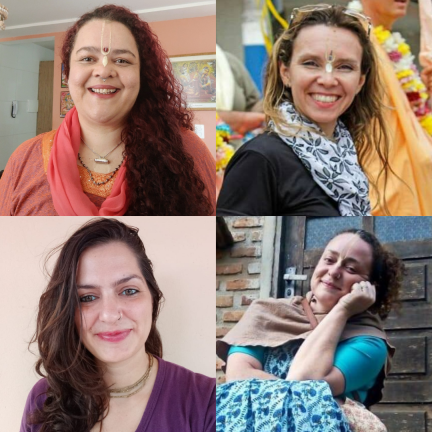
Brazilian Vaishnavi Ministers (top left to right) Gitamrta Dasi and Govinda Gana Dasi, and (bottom left to right) Kalacandji Dasi and Lakshmi Priya Dasi
In Brazil, the Vaishnavi Ministry also trains representatives at various temples; these representatives assist victims and offer guidance on preventing domestic abuse. The Ministry provides a channel for reporting harassment, abuse or violence, with a step-by-step procedure leading to a sentence by the Brazilian ISKCON Justice office. It has created a 30-page Manual Against Domestic Abuse in Portuguese, with contact details for crisis, counseling and law enforcement services. The manual has also been translated into Spanish and will be published for use in all Latin American countries.
“Since we have been operating, there has been a decrease in cases and reports on harassment, abuse or sexual violence in ISKCON Brazil,” says Gitamrta Dasi of the Vaishnavi Ministry.
The Ministry has also established a fund which uses donations, mridanga and sastra course fees to provide financial help for domestic abuse victims. Funds go towards traveling and accommodation for Vaishnavis who need to leave their home or city for safety, and towards maintenance for those who need to reestablish themselves economically after divorce or separation.
United Kingdom
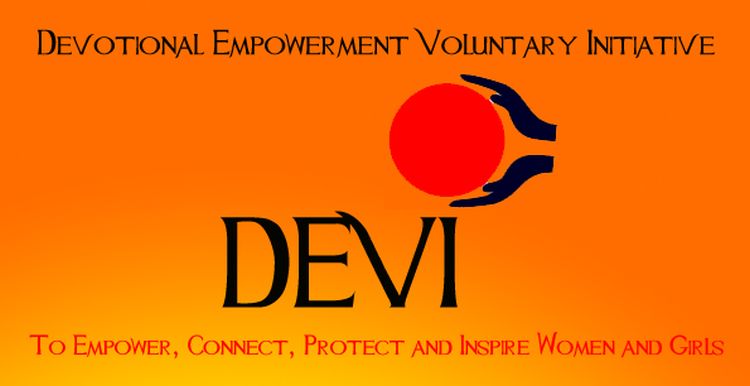
The logo for the United Kingdom’s DEVI (Devotional Empowerment Voluntary Initiative)
In the United Kingdom, Devotional Empowerment Voluntary Initiative – “DEVI”, which aims to empower, connect and protect women and girls, has been tackling domestic violence in ISKCON.
DEVI, with its various initiatives, was set up in 2013 by Madhavi Dasi, a lawyer who volunteers as ISKCON UK’s and the GPO’s legal counsel. DEVI Protect was launched by Madhavi and Bhagavati Devi Dasi at Janmastami 2014 with the Director of the local Women’s Domestic Violence Centre. The process in place is simple – women contacting DEVI are referred to external organizations specializing in domestic violence. This ensures the victim’s anonymity, dignity, and right to protection and to be listened to non-judgmentally. DEVI provides training to educate women to seek early intervention and support by helping them recognize the signs and different types of domestic abuse they are experiencing. By challenging the attitudes and behaviors that propagate violence against women and children, DEVI supports vulnerable devotee women who would otherwise be reluctant to speak about the abuse and seek help.
In 2019, nearly fifty women from ISKCON temples in the UK attended an accredited Domestic Violence training workshop organized and sponsored by DEVI. These devotee delegates trained in domestic violence awareness are now able to triage and direct women in the community to specialist organisations with trained advisers.
DEVI’s equality and diversity policy ensures that there is equal opportunity for women to serve on trustee boards, and within senior management structures. DEVI ensures that there is strict compliance with ISKCON’s zero tolerance to domestic abuse.
Promoting Women’s Voices and Spiritual Lives
Krishnarupa points out that the work of the Vaishnavi Ministry and associated organizations like DEVI around the world is not only to respond to abuse, but also to nurture women’s spiritual life, by making sure they are encouraged to give classes, promoting reading groups, holding networking events to bring women together, and conducting annual surveys among women to ensure their voices are heard in the ISKCON community.
The Future
Looking to the future, the effective system Australia developed of assigning local Vaishnavi Ministry representatives at each temple is in the process of being replicated in North America too. Beyond that, Krishnarupa hopes to develop a fund in Australia and internationally that’s similar to the one used in Brazil, financing the travel and relocation of domestic abuse victims who need to remove themselves from a dangerous home situation. The International Vaishnavi Ministry is also developing an emergency fund for Vaishnavis who live in areas where there are no Ministry representatives. Meanwhile, Krishnarupa hopes to see a premarital counseling course become mandatory for any couple who wants to marry on ISKCON property.
“I believe one of the best ways to at least significantly reduce, if not eliminate, domestic abuse, is to have the authorities take a strong stance in helping educate devotees about it,” she says. “More education will make it less of a stigma to talk about. It’s a silent crime in many ways – victims are reluctant to speak out for fear of being made to feel like it’s their fault. I know of devotees who have been suffering domestic violence for decades in their marriages, and they just can’t speak out for fear of what will happen to them or their children.”
Education can also help to nip domestic violence in the bud – the best way to prevent it. “The experts say that domestic violence is something that starts small, and then builds as the perpetrator realizes what they can get away with,” Krishnarupa says. “So if either the wife or the husband realizes early on in the marriage that this controlling, manipulative behavior is not healthy, then there’s more chance of preventing it from escalating.”
An important part of education is also teaching that domestic abuse is “totally against our Vaishnava culture, and everything that Srila Prabhupada instructed us to do,” Krishnarupa says.
In the Srimad Bhagavatam 4.3.18, Prabhupada writes, “However low a person may be, he is never unkind to his children, his wife, and nearest kin. Even a tiger is kind to its cubs, for within the animal kingdom, cubs are treated very nicely.”
In Chaitanya Charitamrita Madhya Lila 24.272, he asserts, “A man in devotional service is automatically non-violent. He is the best of gentlemen.”
“We shouldn’t behave one way in public, at the temple, and another way at home,” Krishnarupa says. “We shouldn’t think that only the devotees at the temple or outside our home are to be treated as a Vaishnava. We must be very careful not to commit any offenses; that, ‘Oh, it’s just my wife, it doesn’t matter.’ Or, ‘It’s just my husband, it doesn’t matter.’ One thing I say in my seminar is, if Prabhupada knocked on your door, what would he find?”
Keeping this in mind, it’s time for us all to make a difference regarding the problem of domestic abuse in ISKCON.
“I think that if everyone rolls up their kurta and choli sleeves, a lot can be done to make our society more along the lines of what Srila Prabhupada wanted,” says Krishnarupa.
***
If you, or someone you know, is experiencing domestic abuse, there are many excellent professional resources available in most countries. Your local Vaishnavi representative can steer you in the right direction. Devotees seeking help or additional resources on the prevention of domestic abuse in communities without a regional Vaishnavi Minister are invited to contact the International Vaishnavi Ministry at vaishnaviministry@gmail.com
For more information about the seminar ‘Harmony in the Home,’ or for the Vaishnavi Ministry in Australia, please contact Krishnarupa Dasi at: krishnarupa.acbsp@gmail.com
Contact DEVI in the UK: devi@krishnatemple.com
South Africa: https://www.facebook.com/Iskcon-Vaishnavi-Ministry-of-SA-104013621455799
Brazil: https://www.facebook.com/ministeriovaishnavibr или для писем есть https://ministeriovaishnav.wixsite.com/oficial. To donate via PayPal use the email: ministeriovaishnavibr@gmail.com
Read the International GBC Statement Against Domestic Abuse: http://gbc.iskcon.org/wp-content/uploads/2020/05/GBC_Stmt_Domestic_Abuse_2020.pdf
Read the North American GBC Statement Against Domestic Abuse: https://iskconnews.org/iskcon-statement-on-domestic-abuse,6929/
Appendices to the North American GBC Statement: https://iskconnews.org/iskcon-statement-on-domestic-abuse-appendices,6930/
Information on the North American GBC statement condemning domestic abuse:
https://iskconnews.org/iskcon-north-america-releases-statement-on-domestic-abuse,6928/















